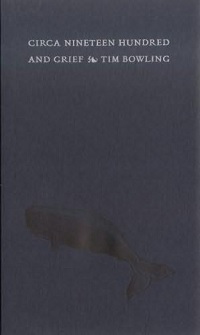
Tim Bowling. Circa Nineteen Hundred and Grief. Kentville, NS: Gaspereau Press, 2014.
~Reviewed by Jean Van Loon
The first poem sets the hook:
This is for men and women
of certain years, who,
having left prints on the sand,
remember the feeling
of castles in their fingers (“Childhood”).
This autobiographical collection brings to life a remembered childhood in the Fraser Delta—the river, salt tides, salmon, herons, fog, rain—and a family wresting a living from land and sea. The memories range from the innocence of the poet delivering newspapers like his dad, “bike tires whispering down long streets in the rain” (“The Cycle”) to the sharp edges of childhood cruelty, and the brutality of the hunt, “Shot! The mallard breaks // like a child’s wrist” (“The Duck Hunter”). Bowling recreates childhood not just for itself, but as the roots of the adult man, exploring the development of the poet, the search for meaning without faith, and the essential solitude of the human soul.
The powerful and memorable poem, “The Looking Glass Scented with Cedar and Rain,” pulls these three elements together, beginning: “The time on the town clock was always wrong. / Then the hands stopped. Then they were gone.” Later, in a short stanza: “I am the hour that is pointed to / and I am kept alone.” Rich layers of physical detail follow, then, refrain-like: “I am book and verse / of a faith without a church / and I am read alone.” More images—vivid and ominous—another refrain-like variant on the theme of alone, and then, a stanza sets out the poet’s calling:
Someone had to step out into the horizon
and bring the sun back to the barn.
Someone had to kneel on bloodstained wood
when the salmon—those unframed oils
hidden away from the wars of men—returned.
A striking feature of this collection is its imagery. About childhood, Bowling writes:
that way of childhood
that never returns to us
when the sun rolls over onto his grass-stained elbow
and slowly closes his earth-eyes
and we can smell every season on his skin. (“The Odyssey”)
And again, in “Landlocked,” looking back with homesickness from the prairie:
I have kept a name
but sunk the self –
…
reflected as I turn back
a child’s face that means
what the globe on the teacher’s desk
means to the gulls
crying without a landing over the world.
Toward the end of the collection, Bowling sets out his faith:
there’s a godhead without a god
a harder faith, neither in man
nor man’s salvation: it sees
emptiness and names it
it sees pain and feels it …
Every bird, unbeliever,
nailed to the cross
of its flight.
In this small, intense book, Bowling nails every bird, recreating a child’s experience of a beautiful but often bloody world. He explores the adult loss of the childhood self and the drive to find meaning by documenting the world as it was and is. In this thoughtful and moving reflection on growing old, Bowling delivers on his title’s dangled bait.
Jean Van Loon holds an MFA in creative writing from UBC. Her fiction, non-fiction, poetry and reviews have appeared in Canadian literary magazines, including one story in Journey Prize Stories 19.
GET HOOKED ON POETRY WITH NEW ISSUES OF ARC!

